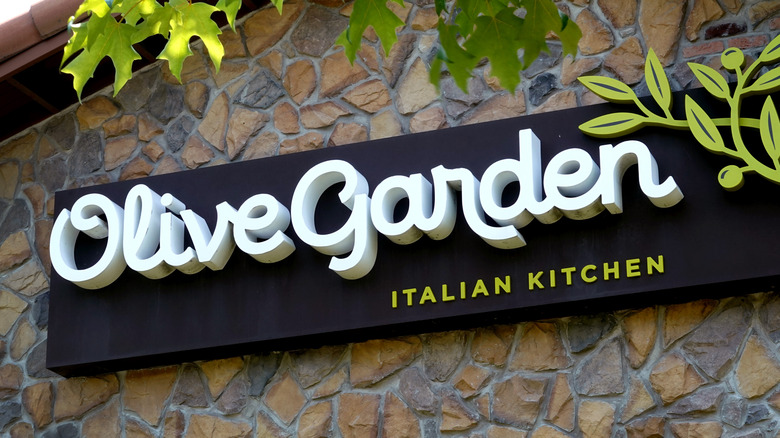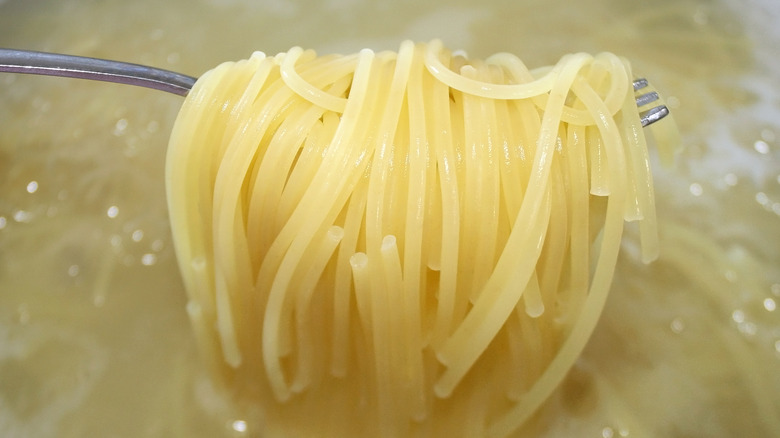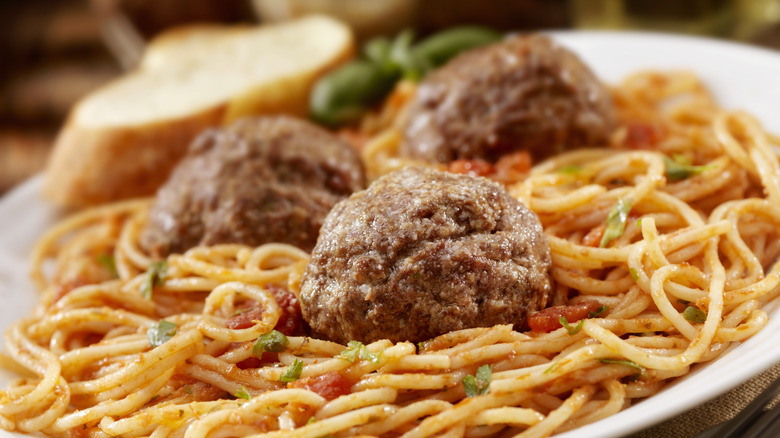Olive Garden Should Be Locked Up For This Culinary Crime
Most people know that a crucial step in making perfect pasta is to add salt to boiling cooking water. This is the only chance you get to season the noodles, and it makes a noticeable difference in how they taste. So, naturally, one would think that Olive Garden — the Italian food and pasta powerhouse chain — would consider this easy step second nature, but, oddly, the company disregards it completely. Olive Garden confirmed that the decision not to salt its pasta water stemmed from the warranties on its cookware, per the Wall Street Journal. Salt can erode materials over time, including cooking vessels, and using salt would essentially void the warranty.
Some have argued that the company is putting its priorities over the overall guest experience by avoiding this quick and simple culinary rule, but the chain believes its sauces and other ingredients make up for the lack of salt in the pasta. And, truly, it seems like Olive Garden's clientele doesn't mind; after all, the company made over $5 billion in 2023, the highest revenue in its 41-year history, according to Nation's Restaurant News. So, clearly, the lack of salt water isn't stopping Olive Garden from continuing to delight millions with its pasta dishes.
Salt is more than just seasoning
Salted water isn't just for making sure cooked pasta tastes good; it also plays a part in maintaining the texture of the noodles. When pasta cooks in boiling water, it begins to break down and release starch. This is why pasta water appears cloudy at the end of the cooking process. Salt actually prevents the pasta from breaking down too much, and keeps it from becoming overly sticky and clumping together.
If you're ever dining at Olive Garden and believe your spaghetti seems cooked beyond al dente, the lack of salt could be a culprit. Of course, overcooking pasta is another gaffe; too much time in the boiling water will ultimately break the pasta down and make it mushy, no matter how much salt is in the water.
So, how much salt is too much? It's been widely said that pasta water should be as salty as the sea. Though, whoever came up with this analogy clearly never swallowed a mouthful of ocean water when a wave hit them in the face, because seawater is salty to the point of tasting awful. Using this much salt would undoubtedly make your pasta taste terrible. A better rule of thumb is to add 1 tablespoon of table salt for every gallon of water. The water should have a pleasant salinity, but not give you a salty slap in the face.
Olive Garden is a regular rule breaker
Olive Garden is more an Americanized version of Italian food, so, can you blame the chain for not following the cardinal rule of salting pasta water? The restaurant giant was, in fact, developed by American company, General Mills in the 1970s. The eatery has always offered dishes like spaghetti with meatballs and chicken parmigiana, which you typically won't find in Italy. So, it's really no surprise that Olive Garden breaks other essential Italian cooking "rules" beyond just not salting its pasta water.
For example, several of the chain's pasta dishes come with meat, like chicken, mixed in with the noodles and sauce. In Italy, pasta courses and meat courses come separately, with the pasta typically coming before the meat is served. The ever-popular fettuccine Alfredo at Olive Garden is also far from being an authentic Italian dish. There is a story of a Roman cook who made a dish of fettuccine tossed with butter and parmesan cheese for his wife, but the version Americans know (made with garlic and heavy cream) is entirely American-made.
And those famous breadsticks that Olive Garden is known for? You won't find anything like this in Italy, either. Yes, Italians love their bread, but it's hardly doused with garlic and cheese, and usually isn't available in an endless supply.


